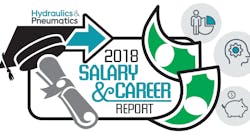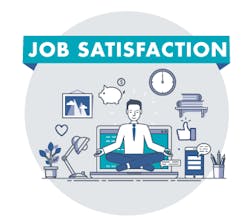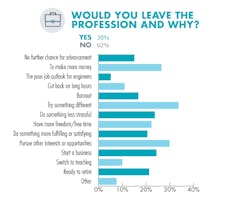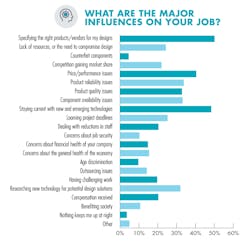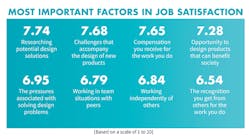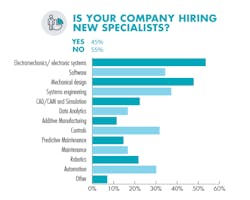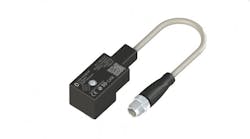Download this article in PDF format.
If we could pay the 1,200 readers who responded to H&P’s annual salary survey a C-Note for every time they used the words satisfaction, opportunity, and problem-solving to describe their job experience, they might just earn their current salary. Well, maybe a month’s worth. In fact, satisfaction is such a big part of what you do, we decided to make it the lead topic in this year’s Salary Survey report. Your reactions inspired the editors to turn your input into a multi-part series. Education and salary details will follow in succeeding installments.
Let’s show you the money right up front:
The average annual salary for the younger respondents (34 and younger) to H&P’s 2018 Salary Survey is $67K. Respondents over 50 averaged $106K. Sandwiched between them, respondents 35 to 50 reported an average annual salary of about $100K.
“It is cheaper to build a rock star than it is to buy one.”
We’ll take a deeper dive into salaries, bonuses, and other compensation numbers in Part 3 of this series, but respondents also told us industrial employers had better expand their focus to bigger-picture factors like career satisfaction and education. The mainstream news media are giving their audiences plenty of reasons to feel uneasy about our world’s problems, so now would be a good time for industry to show how the fixers of this world—engineers, technicians, and mechanics—envision the future. Although the picture they paint isn’t entirely rosy, many of you take tremendous satisfaction from finding ingenious ways to fix broken things and make the industrial world a better place.
The details behind that satisfaction will show why we’re going there first.
How Satisfied are YOU?
When asked, How satisfied are you in your current position?, on a range from not at all, not very, satisfied, very satisfied, and extremely satisfied, 70% of respondents were either satisfiedor very satisfied. Twenty-two percent were extremely satisfied, while only 7% were not very satisfied. Hardly satisfied was hardly selected by anyone. It’s obvious that H&P readers love what they do. In fact almost two-thirds of respondents indicated they never considered leaving engineering. Of those who have considered moving on, their motives differed markedly by age group. The majority of those with decades of experience indicated they were either ready to retire or they were ready to try something different at this stage in their lives. Most of those younger than 35 either wanted to earn more money or to start their own business.
Our readers love what they do so much, most said they’d never considered leaving engineering. Among those who would, reasons differ by age group. Most with decades of experience are either ready to retire or want a new challenge. Those younger than 35 either want more money or to start their own business.
Very few selected “The poor job outlook for engineers” as a reason to leave the field. In fact, 92% indicated they would recommend engineering as a career path. One of the younger respondents (below 34) stated that engineering is the only profession around worth enduring the “Paper Chase” in pursuit of a degree.
This respondent wrote, “An entire generation of Americans has been scammed by academic advisors and other educators. ‘Get a college degree, and you'll have a better paying career than your parents,’ is the promise. So many young students graduate with a lifetime of debt, but no hope of paying it off, since their degrees are effectively useless. Engineering is one of the few professions where a college degree is a worthwhile pursuit. At least there are better job prospects in the world than, say, marine biologist.”
The older respondents (50 and older) were more philosophical about engineering and its value to basic living skills.
“Building elite expertise/experience is not a guarantee of advancement,” one opined. “Engineering is both rewarding and a path to self-improvement. Practice in logical and practical problem solving and verification and adjustment of techniques are valuable when applied in engineering or any other role. Often, those with engineering experience of ten years or more are the only ones who recognize that ‘the emperor has no clothes.’"
Another respondent valued the quality of life engineering affords. “Even here at the end of my career, I find engineering fascinating. It has taken me all over the world, meeting all sorts of people, and, today you can practice it anywhere. Here I am in a hotel in Sombor, Serbia, doing hydraulics work! How cool is that? It just doesn't get old.”
One respondent used this opportunity to recruit young talent to hydraulics. “Good hydraulic engineers are hard to find. We are always looking for them in order to grow. There are many more mechanical engineers than good hydraulic or electrical engineers.”
Fellow respondents agreed about the challenging nature of their field. When asked, Do you feel you are being challenged intellectually with your engineering projects?, 56% indicated they were sufficiently challenged, and 35% said their work was at least somewhat challenging. Only 9% welcomed more challenges.
Here are the top three:
• Specifying the right products/vendors for my designs
• Staying current with new and emerging technologies
• Price/performance issues
One of the more senior respondents cited one of the challenges he can do without:
“The politics of sub-contract departments. that prevent an engineer from working directly with a vendor results in products with performance issues.”
When asked to rate factors that contributed most to their job satisfaction, the top four were:
• Researching potential design solutions
• Challenges that accompany designing new products
• The compensation you receive for the work you do
• Opportunity to design products that can benefit society
These job characteristics tend to keep you and your colleagues on the job.
Some respondents were very specific about the satisfactions of working in the science of hydraulics. One wrote, “Designing prototype hydraulic systems that lead to successful implementations at customer plants.” Another wrote, “Being able to safely and efficiently produce hose [assemblies] is extremely important.”
“Most of the engineers work for accountants now, so we are reporting to people who don't understand what we do for a living or what we need to do our jobs correctly and on time.”
The role fluid power plays in many other technologies was also high on several respondents’ list of satisfactions:
“Everywhere you go, you see products made using fluid power,” one stated. “We make the stuff other people use to make their stuff. Industrial, medical, aerospace, automotive—they all depend on our products to make theirs.”
“Being able to have ‘hands-on,’ intimate interactions with the machines that we design/build/test is rewarding. The worst day on the machine is still better than the best day in the office.”
A Bright Future in Fluid Power
Of course, engineering being so closely tied to quality-of-life issues, many H&P readers take their role in ensuring a bright future seriously. Emerging technologies will provide many of the tools to help make that possible, so H&P’s survey asked if its readers’ companies were hiring new specialists to prepare for emerging technologies. More than half (55%) said no. One seasoned veteran offered a possible reason why:
“It is cheaper to build a rock star than it is to buy one.”
All in all, H&P readers are confident their jobs are in high demand. In fact, those companies building rock stars had better watch out.
Such talents are targeted by headhunters. Sixty-five percent of respondents indicated they’ve been contacted for new job opportunities.
A slim majority of employers (54%) stated they don’t outsource talent either.
This seeming false confidence in employers’ ability to retain their prized engineers may come back to bite a slim majority of companies represented in our survey. Fifty-two percent of respondents indicated their employers haven’t upped their efforts to hang onto them.
Those looking to beef up talent to prepare for future tech advancements are focusing on these top four disciplines:
• Electromechanics/electronic systems (54%)
• Mechanical design (48%)
• Systems engineering (38%)
• Software (34%)
The next installment of H&P’s 2018 Salary and Career Report will focus on the academic route to this field—and whether it is offering sufficient preparation to meet the talent needs of those companies building their businesses around these disciplines.
